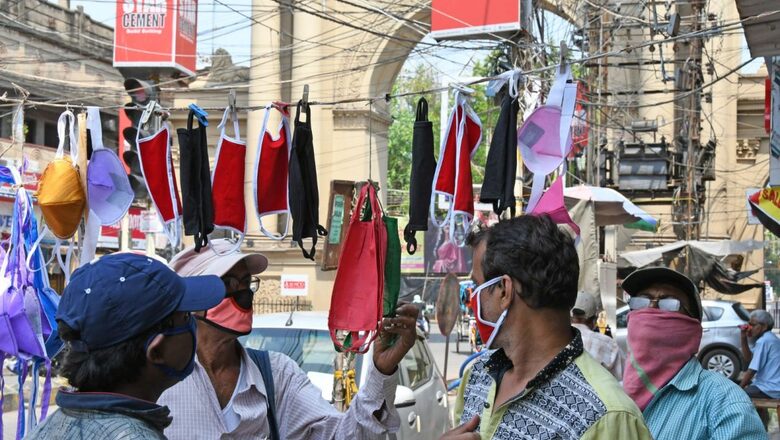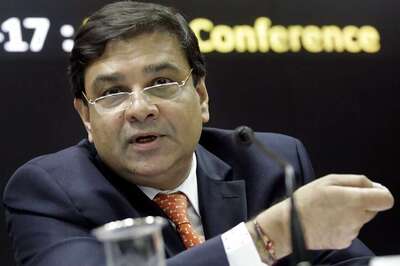
views
It’s back, but maybe not with a bang, if experts are to be believed. For all of us religiously tracking the spike in Covid-19 cases, there may be a panacea in the daily numbers — while coronavirus cases are on the rise, most of these are asymptomatic, giving hope that India may not see yet another deadly wave.
On Thursday, the country recorded over 7,000 new cases in 24 hours after 99 days, registering around a 39 per cent jump in daily cases, while the daily positivity rate crossed 2 per cent after 111 days, the Union Health Ministry said.
This is a big jump from the 5,233 infections and seven fresh fatalities that were recorded on Wednesday when the daily positivity rate was recorded at 1.67 per cent and the weekly positivity rate was recorded at 1.12 per cent, according to the ministry.
Once again, leading the tally was Maharashtra with 2,701 new infections, highest in nearly four months. However, if one closely analyses the numbers, majority of these cases are asymptomatic. The recovery rate of Covid-19 patients is also 98 per cent, a significant improvement from the days of the second wave when fatalities rocked the country.
Mumbai on Wednesday recorded 1,765 new Covid-19 cases, its highest single day count since January 26, but did not report any fatality linked to the infection. Of the 1,765 new patients, 1,682 are asymptomatic. The remaining 83 symptomatic patients have been admitted to hospitals and 11 of them are on oxygen support, the bulletin said. Out of the 24,598 hospital beds, only 293 are occupied.
What about other cities?
Pune hospitals have recorded a 5-10% rise in the number of patients turning up at OPDs, but most of them have mild to asymptomatic disease, doctors said. Another reassuring development has been that almost all patients are reporting shorter fever duration (48-72 hours) with more upper respiratory tract symptoms such as sore throat, blocked nose and cough. Doctors say most patients are facing mild Covid-19 and recovering at home.
In Bengaluru, the number of Covid-19 cases has doubled in the last fortnight but the hospitalisation rate is negligible, indicating that the infections are not as lethal as the second Covid wave of April to June 2021.
The positivity rate in Bengaluru stands at 1.62% on a seven-day average as against the state average of 1.11%, data showed, indicating that the city is likely to see an influx of cases in the coming days. However, there are no active clusters in the city.
The administration and doctors are of the opinion that there will be no wave of cases but isolated peaks which may see mild symptoms.
Chennai, too, has seen an uptick in cases as 95 people tested positive for the infection, followed by neighbouring Kancheepuram district which clocked 30 cases in the past 24 hours. However, Health Secretary J Radhakrishnan noted that so far, symptoms have been mild and hospitalisation also has not shown any substantive or significant increase.
What do the experts say?
A study published in open access journal PLOS Medicine found that “fears about asymptomatic Covid spread were overblown”. According to the study, people infected with SARS-CoV-2 but with no symptoms are 66% less likely to pass on the virus to others.
The team of researchers included 130 studies, with data on 28,426 people with SARS-CoV-2 across 42 countries, including India. They found that “in 130 studies, an interquartile range of 14% to 50% of people with SARS-CoV-2 infection that was persistently asymptomatic, and contacts of people with asymptomatic SARS-CoV-2 infection are less likely to become infected, than contacts of people with symptomatic infection”.
Dr Sujeet Kumar Singh, director of the National Centre for Disease Control, which heads the Indian SARS-CoV-2 Genomic Surveillance (INSACOG) project, said: “There is no reason to believe that the current rise in Covid-19 cases heralds the beginning of the fourth pandemic wave in the country.”
According to Singh, while the rise in cases may be the result of the spread of the BA.4 and BA.5 subvariants in several states, it does not mean much given India’s hybrid immunity in the wake of prior infection with other omicron subvariants and high vaccination coverage, Moneycontrol reported.
Dr N K Arora, chief of the Covid-19 working group of the National Technical Advisory Group on Immunisation, expressed similar views and said the rise in case numbers was the result of unbridled domestic and international travel by Indians after a long gap. “We do not see a reason to be worried or panic yet,” he said.
However, experts and doctors say the rise in cases must not be ignored and precautions such as wearing a mask, maintaining social distancing and avoiding crowded places should be a must, especially with monsoons approaching when propensity for diseases is higher.
Read all the Latest India News here




















Comments
0 comment